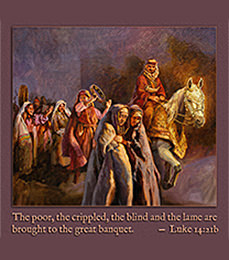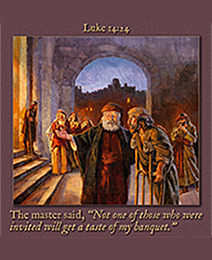Luke 14:15–24 . . . Bible Study Summary with Questions
Jesus Turns the Table
Today's ten-verse passage is a follow-up to last week's fourteen-verse study of Jesus eating at a Pharisee's house (14:1–14). Both sections are centered around a meal table. A prominent Pharisee asked Jesus to eat at his home. A number of things took place at this table, but none were very pleasant; it wasn't a time of friendly conversation and warm hospitality. The meal took place on the Sabbath. Things started off with a confrontation over the legality of healing a man on the Sabbath (vv. 1–6); when guests jockeyed for position at the table, Jesus spoke to this evil as well (vv. 7–11); he then went on to direct his words specifically to the host (vv. 12–14) who'd apparently invited all the prominent people to his table on this occasion.
Last week's passage closed with Jesus saying, "You will be repaid at the resurrection of the righteous" (v. 14). Now we look at our Lord's words in the second half of this section (vv. 15–24), as he "turns the table" on the prominent, likely disturbing everyone dining there. A man called out, "Blessed is the one who will eat at the feast in the kingdom of God," to which Jesus responded by telling all a short but pointed parable. It informed his listeners that, while feasting at the banquet of heaven (i.e., the kingdom of God) would be a blessing, it was a blessing that they wouldn't experience. Indeed, his parable indicated that prominent people would be the ones who'd turn down their blessed invitation; further, they'd be startled, indeed, to realize that those who actually made it into God's kingdom would be those whom they'd never have invited to their own banquets, i.e., the poor, the crippled, the lame, and the blind.
“The Great Banquet” Parable (14:15–24)
The Pharisees were concerned not only with their position at the dinner table of their host but also the table of the kingdom of God. Hearing the mention of the "resurrection of the righteous" (a clear reference to the coming kingdom of God), one man saw a way to defuse the situation by piously calling out, "Blessed is the one who will eat at the feast in the kingdom of God." But he was wrong to have made that statement because he spoke from the vantage point of one who'd surely be sitting at that table. Sadly, this man, like the other Pharisees, assumed that if anyone were blessed (or "qualified" in their eyes) to be seated at an awesome messianic meal in the kingdom of God, it would be him. They all jockeyed for positions in a kingdom they'd never enter.
Jesus speaks words of warning to this man and those like him in this follow-up parable (vv. 16–24). He tells of a certain man who plans a great feast, sending out advance invitations to all his many distinguished guests. Seemingly, God is the host in this parable; the feast is the kingdom of God; the invited guests are the people of Israel, the Jews, who implied, by their deeds and words, that they'd surely be part of God's promised kingdom.
In the first-century world, a dinner (or wedding) invitation involved two distinct actions: (1) the preliminary invitation was broadcast to townspeople on the guest list at a time prior to the planned event, and (2) a subsequent personal summons to the meal or event was made when the occasion was about to begin. So, here, the invitations have been made, the feast is ready, but the summoned guests "welsh," failing to honor their host's special invitation. Not coming to a banquet after previously indicating acceptance was a grave breach of social etiquette; that was an insult to the host. All have their excuses for welshing on the personal summons they received: One man excuses himself to look at land he's recently purchased; another declines because he must "try out" his newly purchased oxen; a third feels that he has to stay at home with his new wife. This great banquet's invitation rejections, while being representative of many, were unanimous; the excuses were lame.
The Israelites — the invited guests whom God invited and who appeared to be planning on participating in the kingdom of God — failed to accept the personal summons when it arrived. Seemingly, they had better, more important things to do. As a result of their declining God's invitation into his kingdom, he offers the blessing of participation in his kingdom to those who wouldn't have been considered acceptable guests, the very ones whom God has told his host to invite to their own feasts, i.e., the poor, crippled, blind, and lame. (Incidentally, the list of guests to be invited is identical to the list Jesus had suggested to his Pharisee host in v. 13: those who couldn't repay the host by inviting him in return.) But God doesn't limit his blessed invitation to the rejected, lower-classed Israelites; he even invites unsuitable people from near and far, compelling them to come. Such people would have felt very uncomfortable at the feast of a rich man, very much feeling socially out of place. Yet he's instructed his servants not to take "No" for an answer, encouraging and strongly urging everyone they meet to accept this valuable invitation. For their benefit, God won't allow them to decline his life-changing invitation, not because they're the ones who'll choose if they'll be one in God's kingdom, but because God is the one who's chosen them to become a part of that kingdom. God's sovereign purpose is to prevail.
Who's who in the Great Banquet Parable? The host is God the Father, inviting his people Israel to the messianic banquet in the kingdom of God. The rich and socially elite who reject at the last minute the host's personal summons are the Pharisees and Jewish religious establishment who'll begin to plot against Jesus and eventually render the ultimate insult of having Jesus executed as a common criminal. The poor and downtrodden are the common people, considered unclean by the Pharisees. Perhaps those inside the town are the Jews while those in outlying country areas are the non-Jewish Gentiles.
Remember that Luke's readers of the day were the Gentiles. This pair of parables… last week's (vv. 1–14) and today's Great Banquet (vv. 15–24) is a testimony to the Gentiles, showing them how the blessings of the Jews can be received and appreciated by the Gentiles, since the majority of Jews will fail to grasp what God offers and become unwilling to accept his heartfelt invitation to be one with him in his kingdom.
For the Jews: What a powerful parable pair Jesus has given his Jewish audience! Warning: Those who'd strive to enter and be given a first-place seat in God's kingdom ought first to accept the Lord's invitation appreciatively, in order to eventually enter his kingdom.
[You can see in Warren's commentary on Jesus' Parable of the Great Banquet how Jesus presents in this 'judgment' parable those who ignore the Master’s invitation to His banquet choose their punishment; so it’ll be with God’s judgment on those who choose to reject Christ.]
Concluding Realizations
Position vs. possession The Jews of the day had been told a lesson by the words of our Lord's two-part dinner parable. They assumed that they had a prominent position or place at the "table" to be found in the kingdom of God; their only concern was which table position they'd have earned. Sadly, instead of being concerned with their position in God's kingdom, it never occurred to them to first be concerned with their possession of it. The last verse of our passage is a solemn warning to the Jews: They'll miss out on all that they self-righteously presumed they'd be given.
The Jews lost out on the kingdom of God because they rejected God's clear invitation, in the person of Jesus Christ, Israel's king. Christ remains today the key to our salvation. The only way we can go to heaven (i.e., enter the kingdom of God by accepting his invitation and sitting at the banquet table), is by accepting and honoring Jesus Christ as the Son of God, God's King and Savior. Have you yet accepted his personal summons and given Jesus your RSVP to his great banquet invitation?
Note: While Luke’s gospel opens with Jesus’ birth, Luke shows in the first nine chapters how Jesus is the Messiah and God’s true prophet to Israel. Then, in this next section, Jesus and his disciples go on a long trip to Jerusalem to celebrate the Passover. Highlights in the following ten chapters include:
Jesus sends seventy-two disciples | The “Lord’s Prayer” taught by Jesus
Fifteen well-known Jesus parables | Jesus’ Sorrowfulness for Jerusalem
The coming of the kingdom of God | Jesus Comes to Jerusalem as King
› Watch BibleProject’s superb animated video (5 min.) that includes several highlights included in chs. 9–19 of Luke’s gospel.
- Q. 1 What did the pious guest in v. 15 believe about the feast in the kingdom of God, and who'd be there with him?
- Q. 2 What exactly is it that angers the host (v. 21)?
- Q. 3 What made the host so angry that he urgently invited and compelled people to fill his house (v. 21–23)?
Luke 14:15–24 (Lukas)
New International Version (NIV)
[To view it in a different version, click here; also listen to chapter 14]
The Parable of the Great Banquet
15When one of those at the table with him heard this, he said to Jesus, "Blessed is the one who will eat at the feast in the kingdom of God."
16Jesus replied: "A certain man was preparing a great banquet and invited many guests. 17At the time of the banquet he sent his servant to tell those who had been invited, 'Come, for everything is now ready.'
18"But they all alike began to make excuses. The first said, 'I have just bought a field, and I must go and see it. Please excuse me.'
19"Another said, 'I have just bought five yoke of oxen, and I'm on my way to try them out. Please excuse me.'
20"Still another said, 'I just got married, so I can't come.'
21"The servant came back and reported this to his master. Then the owner of the house became angry and ordered his servant, 'Go out quickly into the streets and alleys of the town and bring in the poor, the crippled, the blind and the lame.'
22"'Sir,' the servant said, 'what you ordered has been done, but there is still room.'
23"Then the master told his servant, 'Go out to the roads and country lanes and compel them to come in, so that my house will be full. 24I tell you, not one of those who were invited will get a taste of my banquet.'"

